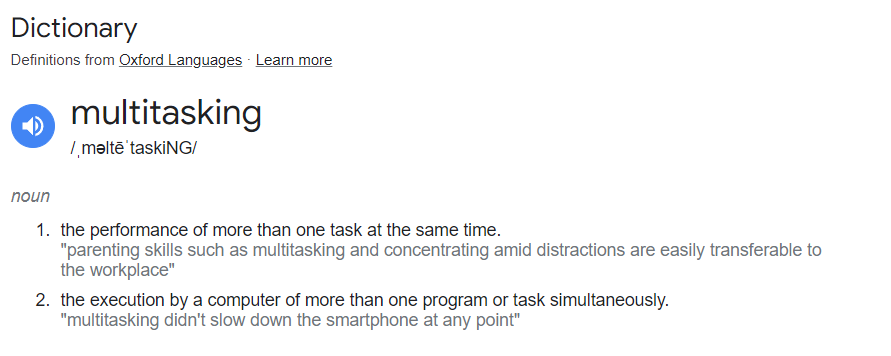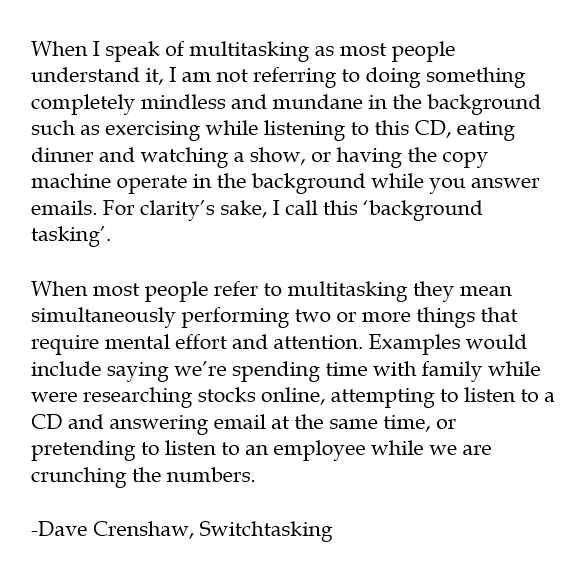June 15th, 2024 – Multitasking Misconceptions Addressed

I need to clear the air on a few things.
I want to come back and talk about this because when I posted my blog about multitasking back in March of 2024, my family had a field day. First off, love them for reading my blog. Second, they made me realize there are some crucial distinctions that should be made that may not have been apparent when I wrote the article the first time.
When I released the multitasking blog, I was met with a lot of criticism about how people can perform multiple tasks at the same time, and how there are examples in everyday life of people successfully managing the completion of multiple tasks within the same fixed time period.
My sister has worked in fast-paced environments her entire working career, where she has been expected to do multiple things at once, successfully, and quickly. She is amazing at it, and she has always been incredibly talented in her field. So, when she saw that I had discussed the myth of multitasking, she definitely had a few things to say.
It took a lot of back and forth before I realized that we had some fundamentally different definitions at play in our discussion. I also realized that if she was thinking this, then she’s probably not the only one. With that in mind, I want to make some clarifications and further explain the myth of multitasking.

What is Multitasking?
If you look up the definition of multitasking, it will say:

When we speak of multitasking in the context of cognitive abilities, we refer to the ability to spread our attention to two or more high-functioning tasks simultaneously. Refer to this quote by Dave Crenshaw in his book, The Myth of Multitasking:

The distinction needs to be made here between background tasks (mindless tasks) and tasks that fully require your attention.

Task Switching vs Multitasking
In my previous article, I spoke at length about the harm that our attempt at multitasking can cause. Since we can never truly focus on more than one thing simultaneously, we are making feeble attempts at it by task switching. This is what causes the long-term damage I previously spoke about. Task switching involves your brain moving through items sequentially, and continually shifting focus from one to the other. This is performed when all tasks require a large amount of attention or processing power. In this event, we are using the same part of our brain, the pre-frontal cortex.
Attempting to stress this part of our brain by dividing it to focus on more than one high-functioning task at a time will cause long-term damage to our brain and body, while inevitably decreasing our performance, productivity, and efficiency. Now, if you’re thinking, “Well, a piano player can play two different things from left to right hand. Wouldn’t that be considered two high-functioning tasks?” I’m getting to that. Hold your horses.

Dual Tasking vs Multitasking
As long as they are not both high-functioning tasks and/or there is a level of muscle memory available, tasks can be performed in tandem. My sister used the example, “How then, are chefs and baristas able to take an order from a customer or waitress while simultaneously making the food/beverage for a different order?” This is similar to the question about the pianist. A certain amount of this is task switching. Your brain moves so quickly, sequentially through these tasks that it gives you the illusion of simultaneous function.
But, there is also a level of muscle memory at play with performing a task you have performed a thousand times. It requires no real attention from the brain, therefore it uses an entirely different section of your brain than processing the incoming information from a customer/waitress would, as in my sister’s example. Within the example of the pianist, the task itself is much more complex than making coffee, but there is still an advanced muscle memory at play. The task switching is milliseconds, but it is still sequential.
When you are able to perform tasks that require almost no attention from your brain, and you can rely on muscle memory, it’s called Dual Tasking. You are performing tasks that require two entirely separate sections of your brain because the tasks require very different levels of attention and focus, such as making coffee and taking a customer’s order.
If you’ve ever been to a coffee shop and noticed the barista making an order while listening to you order your own drink, the speed at which that person performs the task informs you of their level of familiarity with this task. A seasoned veteran would be relying on muscle memory to make the coffee while relying on their pre-frontal cortex to talk to you. Someone who is new to the job will be task switching because both jobs still require the same mental load, therefore, they’ll be making coffee slower, or they won’t be making it correctly.

Involuntary tasks
Yes, you can walk and talk at the same time. No, that’s not multitasking. Aditya Murthy, associate professor for the Centre for Neuroscience at the Indian Institute of Science explains the lack of mental stress involuntary tasks requires. He says,
“However, there are certain actions that occur involuntarily such as breathing and walking or thinking and talking. Some functions are involuntary, such as when you initiate to walk, the spinal cord takes some decisions”
Walking is something your brain doesn’t need to think about at all, and therefore it requires absolutely zero mental stress. That is why you can perform other tasks while you are walking, talking, or breathing. Your brain does not need to make the decision to breathe, your body requires it so your brain provides it. There is no decision-making involved.
Multitasking does not refer to performing tasks at the same time that require two entirely different mental loads. It is in reference to high-functioning tasks that require similar amounts of attention, focus, or effort, that would need to be performed by the same cortex in the brain.

To conclude
I wanted to take the time to come back to this specifically because I realized that there may have been some opportunities for misunderstanding in my previous writing. I knew the myth of multitasking was controversial and I should have made more of an effort to explain the specific definition in this context, as well as acknowledge the work done by those successfully task switching or dual tasking.
Our definition of multitasking and our attempts at it can cause significant issues in our cognitive function and productive output. I don’t want to negate those either. You can cause significant problems for yourself by attempting to multitask rather than monotask as your brain wants to do. Make sure to take your health, mental and physical, seriously and make the time you need to complete all of your tasks effectively, in a productive manner, and in a healthy way.
If you enjoyed this week’s blog post, make sure to leave a comment down below and check back for a new blog post on the Next Step Scopist blog!
References
Telis, Gisela. 15 April 2010. Multitasking Splits the Brain. American Association for the Advancement of Science. Find the link here
Charron, Sylvain and Koechlin, Etienne. 16 April 2010. Divided Representation of Concurrent Goals in the Human Frontal Lobes. American Association for the Advancement of Science. Find the link here
Medina, John. 22 April 2014. Brain Rules. Pear Press.
Crenshaw, Dave. 18 August 2008. The Myth of Multitasking. How Doing It All Gets Nothing Done. Jossey-Bass Publishing.
Leland A, Tavakol K, Scholten J, Mathis D, Maron D, Bakhshi S. 29 Dec 2017. The Role of Dual Tasking in the Assessment of Gait, Cognition and Community Reintegration of Veterans with Mild Traumatic Brain Injury. Mater Sociomed. Find the link here
Murthy, Aditya & Ray, Supriya & Shorter, Stephanie & Priddy, Elizabeth & Schall, Jeffrey & Thompson, Kirk. March 2007. Frontal Eye Field Contributions to Rapid Corrective Saccades. Journal of Neurophysiology. Find the link here
—-
Last Post: Books That Changed My Perspective
Next Post: Why Did I Choose The Name, ‘Next Step Scopist’?
2 responses to “Multitasking Misconceptions Addressed”
-
I used to multitask so much that it affected my focus
-
It’s not a good habit, and it is so bad for your productivity! You’re much better off trying other methods, like timeboxing to better manage your attention and time!
-

Leave a Reply